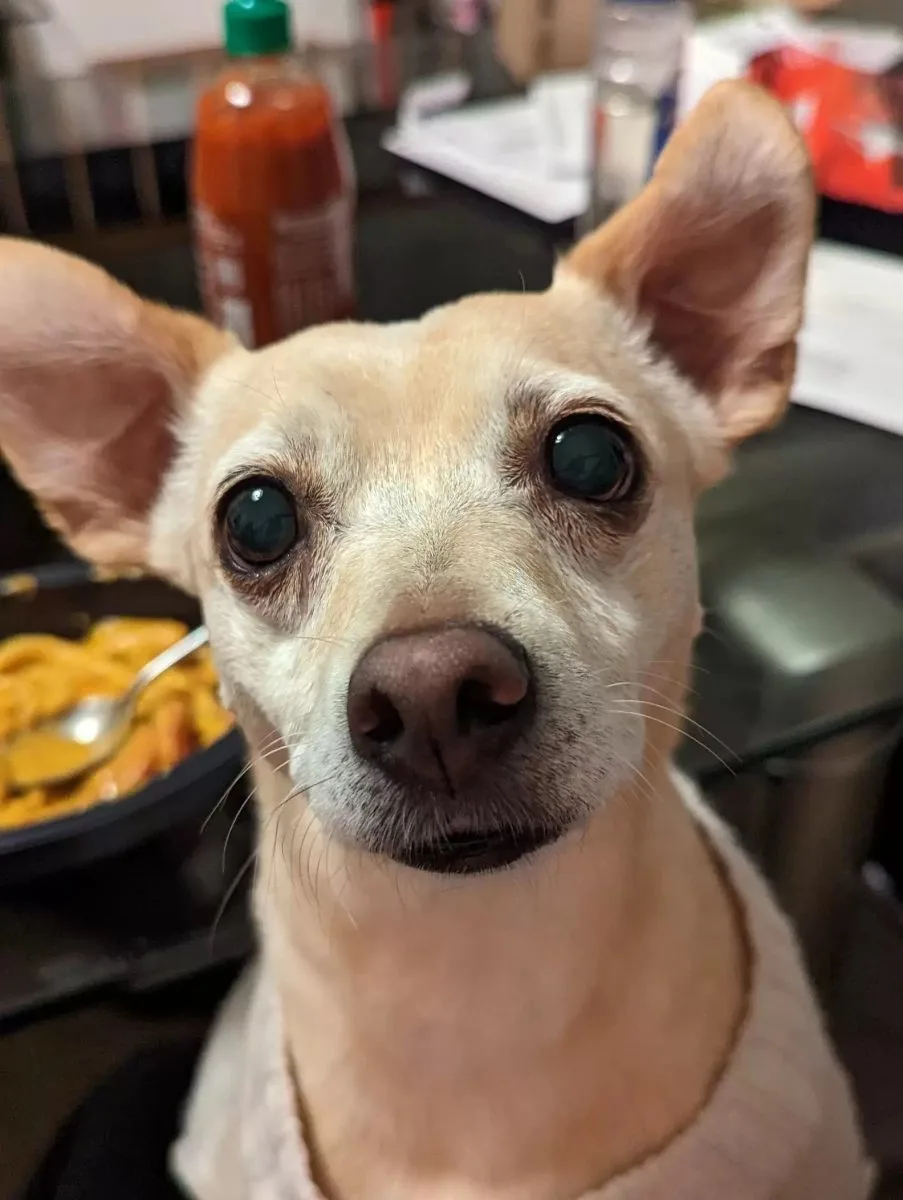I’ve heard of many unusual things dogs do, but this is a first.
At first glance, Katie looks like any other dog – an average indoor pet, some might say – but she’s actually a superhero in disguise.
She’s both smart and hilarious, and she has learned a skill that’s pretty impressive for a dog.
This skill has quickly turned into a regular habit that even prompted her owner to seek an opinion from her veterinarian, which eventually brought the whole office to laughing.
A Dog With A Superpower

Everything started quite randomly a couple of years ago when Katie’s owner, Michelle, noticed her doing something unusual.
“Katie taught herself the basic workings of static electricity,” Michelle told The Dodo.
Katie was basically rolling around on the carpet, which she usually does for fun, when all of a sudden, she got up and approached Michelle’s foot for a quick sniff.
But, when Katie’s little nose touched Michelle’s foot, it happened – zap!
Katie gave Michelle a light electric shock, which probably built up through the friction of rolling around on the carpet.
And, it turned out that Katie absolutely loved it. Her tail immediately began to wag.

It didn’t take long for her to learn that by rolling around, she could produce these ‘zaps’, and she was obviously doing it intentionally after some time.
“She got better at building charges. The zaps became more noticeable to the point where you could hear the static cracking in her fur before she zapped you. It became pretty obvious it was intentional,” Michelle said.
‘Zaps’ are now a regular daily habit of Michelle and Katie’s lives.
Whenever Katie sees Michelle, she greets her with a zap. “We’ll usually thank her: ‘Thanks for the zap, Katie. Very much appreciated,’” Michelle said.
Katie’s Love Of Wielding Electricity

It’s obvious that Katie just loves being zapped and giving her household members little electric shocks.
Everyone is convinced that she thinks they love it, too.
Generally, they love her superpower, but there have been a few times when it turned out to be problematic.
Once, Katie’s zap broke an e-reader, and another time, it caused Michelle’s laptop to bug.
“We now do our best to keep the newer, more expensive electronics out of zapping range from her,” Michelle said.
To be completely safe and at peace, Michelle eventually contacted her veterinarian to ask them for a professional opinion.
She even shared a video to show them exactly what and how she does it.
To her surprise, the veterinarian and their whole team found it hilarious.

Katie’s zaps were nothing but hilarious, and she even got professional approval to keep doing it.
She takes it seriously, so she keeps zapping her owners a couple of times a day.
“She seems to honestly enjoy the sensations. In fact, the bigger the zap, the faster her tail wags, and she’ll run off to try to build a bigger charge in those cases. She seems to think the zaps brings us as much happiness as it does her, so we’re typically happy to oblige and give her a head scratch. Dogs are so precious, each one filled with their own special quirks,” Michelle said.
In the end, those little zaps do indeed bring happiness to the whole household because having Katie with all her special quirks equals a lot of happiness.
If you’ve ever woken up to the unpleasant surprise of your furry friend peeing on your bed, you’re not alone. It can be frustrating and puzzling to understand why your dog chooses such an inopportune spot for their bathroom break. As a seasoned dog trainer, I’ve encountered this issue countless times, and there are a few common reasons behind this behavior that we’ll explore together.
Your bed holds a significant place in your scent landscape, making it a prime target for your dog’s marking instincts. From separation anxiety to territorial behavior, there are various factors that could be triggering this unwanted habit. Understanding the root cause is the first step in addressing and resolving this issue, ensuring a harmonious cohabitation between you and your beloved pet.
Understanding the Behavior: Why Does My Dog Pee on My Bed?
The Canine Perspective
Dogs may pee on your bed due to various reasons from their point of view. It could be their way of marking territory or seeking comfort by being close to your scent. Understanding your dog’s perspective can help address the behavior.
Medical vs. Behavioral Causes
When your dog pees on your bed, it’s essential to consider both medical and behavioral factors. Medical issues like urinary tract infections can cause accidents, while behavioral reasons such as anxiety or insufficient potty training should also be taken into account. Consulting with a vet can help rule out medical problems.
Common Medical Reasons for Inappropriate Urination
Urinary Tract Infections (UTIs)
If your furry friend is peeing on your bed, it could be due to a urinary tract infection (UTI). Just like humans, dogs can also suffer from UTIs, which can cause discomfort and an increase in urination. Dogs with UTIs may struggle to hold their bladder and might urinate in unusual places like your bed. It’s essential to consult your vet if you suspect your dog has a UTI so they can receive the necessary treatment.
Hormonal Imbalances
Hormonal imbalances can also lead to inappropriate urination in dogs. Issues such as an overactive thyroid or adrenal gland problems can affect your dog’s hormonal levels, leading to changes in their urinary habits. If your dog is peeing on your bed frequently, it’s advisable to have them checked by a vet to rule out any hormonal imbalances that could be causing this behavior.
Kidney Issues
Kidney problems can contribute to your dog’s urination behavior, including peeing on your bed. Kidneys play a vital role in filtering waste from the body, and if they are not functioning correctly, it can result in increased urination frequency and accidents in the house. If your dog displays consistent inappropriate urination, especially on your bed, it’s crucial to have their kidneys evaluated by a veterinarian to identify and address any underlying issues promptly.
Behavioral Causes: Anxiety and Marking
Separation Anxiety in Dogs
Dogs may pee on your bed due to separation anxiety. When you leave, your furry friend feels distressed, causing them to seek comfort in your scent on the bed. This behavior is a way for them to cope with your absence.
Territorial Marking and Asserting Dominance
Territorial marking is a common reason dogs urinate on your bed. By marking their territory, they assert dominance and establish ownership. This behavior is instinctual for dogs and is often triggered by changes in their environment or the presence of unfamiliar scents.
Submissive or Excitement Urination
Submissive urination occurs when your dog feels intimidated or overly excited. It’s a submissive gesture to show respect or avoid conflict. Excitement urination happens when your dog gets too worked up, like when you come home after being away. They pee due to the overwhelming rush of emotions.
Training and Prevention Strategies
Establishing a Routine
Creating a consistent routine for your dog can help prevent accidents on your bed. Take your furry friend out for regular walks, especially after meals, playtime, and waking up in the morning. Establish a feeding schedule to regulate their bowel movements. By keeping a structured routine, you can reduce the chances of your dog urinating on your bed due to unexpected breaks in their schedule.
Positive Reinforcement Techniques
Use positive reinforcement to train your dog not to pee on your bed. Reward them with treats and praise when they urinate in appropriate areas, such as outside or on pee pads. Avoid punishing your dog for accidents, as this can create fear and anxiety, potentially leading to more inappropriate urination. By consistently rewarding good behavior, you can encourage your dog to continue going potty in the right places.
When to Seek Professional Help
If your dog continues to pee on your bed despite implementing training and prevention strategies, it may be time to seek help from a professional. A veterinarian or a certified dog trainer can assess the situation and provide expert guidance on addressing underlying issues causing this behavior. Medical conditions, unresolved anxiety, or other behavioral issues may require specialized intervention to help your furry companion overcome their habit of urinating on your bed.
Cleaning and Managing Accidents
Immediate Steps After an Accident
When accidents happen, act promptly. Firstly, use paper towels or old cloths to blot up as much urine as possible. Next, clean the area with a mixture of water and mild detergent to remove any odor. Then, use a pet-specific enzyme cleaner to break down the urine molecules, preventing your dog from revisiting the spot. After that, allow the area to dry thoroughly. Lastly, keep your pup away from the area until it’s completely clean and dry to prevent further accidents.
Ensuring Proper Hygiene and Odor Removal
Maintaining cleanliness is crucial. Regularly wash your bedding and mattress covers with an odor-neutralizing detergent. In between washes, sprinkle baking soda on the mattress, let it sit for a few hours, and vacuum up to remove any lingering smells. Additionally, consider using a waterproof mattress cover to protect your bed from accidents. Remember, consistently using these hygiene and cleaning practices can help prevent future incidents and keep your sleeping area fresh and clean.
Conclusion
Understanding why your dog may be peeing on your bed is crucial for addressing this behavior effectively. From marking instincts to medical issues like UTIs, hormonal imbalances, and behavioral triggers such as separation anxiety, there are various factors to consider. Consulting a vet to rule out any underlying medical conditions is essential. Implementing training strategies, establishing routines, and seeking professional help when needed can help in preventing future accidents. Remember, patience and consistency are key in addressing this issue. By taking proactive steps and being attentive to your dog’s needs, you can create a comfortable and clean environment for both you and your furry friend.
Frequently Asked Questions
Why do dogs urinate on their owner’s bed?
Dogs may urinate on their owner’s bed due to marking instincts, separation anxiety, and territorial behavior.
What are the common medical reasons for dogs urinating inappropriately?
Common medical reasons for inappropriate urination in dogs include urinary tract infections (UTIs), hormonal imbalances, and kidney issues.
When should I consult a vet if my dog is peeing on the bed?
Consult a vet if your dog is frequently urinating on the bed to rule out medical conditions like UTIs or hormonal imbalances.
What are the behavioral causes for dogs urinating on the bed?
Behavioral causes for dogs urinating on the bed include separation anxiety, territorial marking, and submissive or excitement urination.
How can I prevent my dog from urinating on the bed?
Prevent your dog from urinating on the bed by establishing a routine, using positive reinforcement techniques, and seeking professional help if the issue persists.
How should I clean and manage accidents if my dog urinates on the bed?
Clean and manage accidents promptly by using proper hygiene and odor removal techniques to prevent future incidents and maintain a clean sleeping area.
[no_toc]

Hey there, I’m Janet Brooks, a dog-loving student from California. I’m all about helping pups in need, especially those without homes. Me and my awesome friends work together to give shelter and love to stray dogs. Oh, and I also write blogs about dogs to share helpful info.